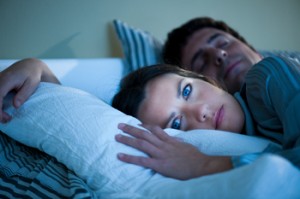 There’s nothing worse than not being able to sleep. Whether you have difficulty going to sleep in the first place or routinely wake up in the middle of the night, unable to fall back asleep, the end result is the same: stress, exhaustion, and sleepiness during the day. Because the term “insomnia” is so commonplace, it can be easy to self-diagnose—after all, if you regularly have trouble sleeping, you must have insomnia and just stress. Right? As it turns out, most people who think they have insomnia are actually suffering the effects of a sleep disorder—as many as nine out of ten people who volunteered for clinical studies relating to insomnia were disqualified after an initial test proved their sleeplessness resulted from disordered breathing, rather than actual insomnia. They didn’t need drugs to sleep, or antidepressants to help their mood, at all.
There’s nothing worse than not being able to sleep. Whether you have difficulty going to sleep in the first place or routinely wake up in the middle of the night, unable to fall back asleep, the end result is the same: stress, exhaustion, and sleepiness during the day. Because the term “insomnia” is so commonplace, it can be easy to self-diagnose—after all, if you regularly have trouble sleeping, you must have insomnia and just stress. Right? As it turns out, most people who think they have insomnia are actually suffering the effects of a sleep disorder—as many as nine out of ten people who volunteered for clinical studies relating to insomnia were disqualified after an initial test proved their sleeplessness resulted from disordered breathing, rather than actual insomnia. They didn’t need drugs to sleep, or antidepressants to help their mood, at all.
The first question that arises is why does it matter if you are suffering from a sleep disorder or insomnia, if it amounts to the same thing? The reason it is so important to determine the cause of sleeplessness is that treatment will vary depending on whether or not you have insomnia or one of the many sleep disorders that results in nocturnal wakefulness. Doctors who are not aware of how common sleep disorders are routinely prescribe sleeping aides to patients who complain of insomnia, but because the root cause of their problem is a sleep disorder the sleeping pills will never fix the problem. There are many treatment options available for patients with sleeping disorders, but these tend to be quite different than how insomnia is treated in patients without an underlying sleep disorder.
All these similarities and crossovers may raise an obvious question: since these two conditions are so similar, how can you tell the difference? Fortunately, it is an easy process to be evaluated and tested for sleep disorders by a sleep specialist. If you think you have insomnia, it is a good idea to be evaluated by a sleep specialist. You may need a study called a polysomnogram (PSG) if your insomnia lasts longer than three months. This is true especially if you have increased movements at night or do not wake up refreshed. This test is a non-invasive test, and is the fastest, most accurate means of testing for sleep disorders. The PSG will not only determine what, if any, sleep disorder is present, but also give your physician a complete picture of your sleeping pattern, which in turn will enable them to treat the cause of your sleeplessness, not just reach for the script pad for a drug. Sometimes Cognitive-Behavioral Treatment for I is indicated. But the critical step is the diagnosis of the root cause of insomnia.
At Rowe Neurology Institute, we have the most current diagnostic tools, and a staff of neurologists and integrated caregivers who specialize in sleep disorders. We perform 1,500 in lab sleep studies annually for the patients with complex sleep disorders at our accredited sleep disorders center. And we review those studies in detail with our patients. We want them to be their best selves again. We show them how.